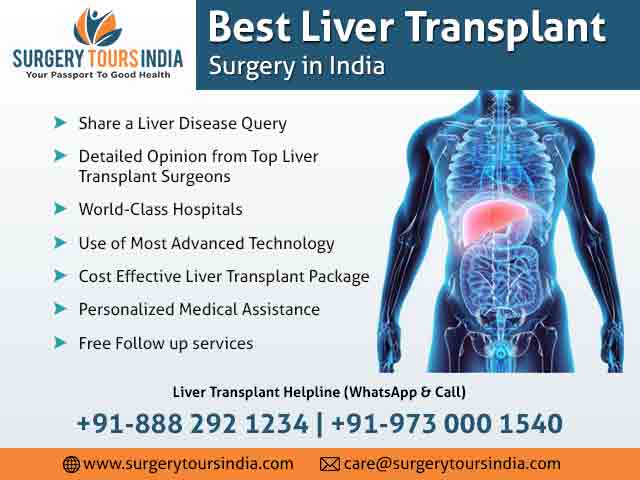Liver Transplantation in India
What is a Liver Transplant ?
It is common knowledge that the liver is the largest internal organ weighing about 3 pounds and acts as a storage house by removing toxic byproducts of certain medications. Liver Transplant is an operation that replaces a diseased liver with a healthy liver or a segment of a liver from another person called the donor. The most common technique is Orthotopic Transplantation in which the liver is removed and is replaced by the donor organ in the same anatomic location as the original liver. Liver failure can occur suddenly or as a result of complications from certain medications. Liver transplants are the most accepted treatment for end stage liver disease and acute liver failure. After a transplant, the patient will be free from the disease and lead a fairly normal life. Liver Transplants are classified as
- Deceased Donor Liver Transplant (DDLT) : The full liver is used when the donor organ comes from a brain dead but heart beating donor.
- Living Donor Liver Transplant (LDLT) : A half (or hemi) liver is used when the donor organ comes from a living donor.
- Auxiliary Transplantation : In this a part of the liver of a healthy adult donor (living or cadaver) is transplanted into the recipient. The patients' diseased liver remains intact until the auxiliary piece regenerates and assumes function and then the diseased liver may then be removed.

Criteria for Liver Transplant
When the liver is so diseased that is not able to maintain the normal body functions, then liver transplant is required. There are various conditions that can lead to a liver failure. They are :
- Alcoholism
- Biliary Artresia (malfunction of the bile ducts)
- Wilson's Disease ( a rare inherited disease with abnormal deposition of copper throughout the body and liver)
- Alpha 1 Antitrypsin Deficiency (abnormal accumulation of alpha-1 antitrypsin protein in the liver resulting in cirrhosis)
- Liver Cancer
- Primary Biliary Cirrhosis ( a condition where the immune system inappropriately attacks and destroys the bile ducts)
- Sclerosing Cholangitis (scarring and narrowing of the bile ducts causing the backup of bile in the liver)
- Hemochromatosis ( a common inherited disease where the body is overwhelmed with iron)
Tests Required Before Getting a Liver Transplant
To update previous tests, some of the diagnostic studies are performed during an evaluation. They are
- Doppler ultrasound to determine if the blood vessels to and from the liver are open.
- Pulmonary function studies to determine the lungs' ability to exchange oxygen and carbon dioxide.
- Echocardiogram to help evaluate the patient's heart.
- Computed tomography which uses X-rays and a computer to generate pictures of the liver and showing its shape and size.
- Blood tests examine blood type, biochemical status of blood, clotting ability and to gauge liver function. AIDS and Hepatitis tests are also included.
For more information on Liver Transplantation criteria ,please read Liver Transplant Guidelines in India
Donor for Liver Transplant
- Living-Donor : This process involves removing a segment of liver from a healthy living donor and implanting it into a recipient. Both the donor and recipient liver segments will grow to a normal size in a few weeks.
- The donor must be a blood relative or spouse. Blood type and body size are critical factors in determining an appropriate donor.
The procedure involves few steps :
Following organs can be transplanted -
- The surgery usually takes 5 to 6 hours
- Liver Transplantation is performed under a general anesthesia.
- Prior to surgery a tube is placed through the mouth of the patient into windpipe to help breathing during the operation.
- A Y-shaped incision in the abdomen is made and the diseased liver is removed. Donated liver is then inserted and attached to the major blood vessels and to the bile ducts. The incision is then closed at the end of the surgery.
Advantages of Liver Transplant :
- Provides a chance for a longer active life.
- If the transplant is performed before the recipients's health deteriotes then they are able to tolerate the surgery and recovers more quickly.
- The recovery can sometimes become difficult but the anti - rejection makes the process easy.
- The donors will discharge in a week and recipients in 2 to 3 weeks.
Post Liver Transplant
The process involves carrying out daily life activities and recovering to the level of health. The process can be slow which includes simple activities like walking, deep breathing to ensure the lungs stay healthy to prevent pneumonia, well balanced diet and exercise to build up the muscles weakened by illness.
Cost of Liver Transplant in India
It is not without a reason that India is highly preferred as a medical tourism destination. The low treatment cost for Liver Transplant allows people from lesser developed countries to avail and ensure the best medical care. Compared to the West, surgical and consultation fees are really less. We still advocate a thorough research through the Surgery Tours IndiaIndia website, before finalizing a particular healthcare center.
